A high risk payment gateway is designed to securely process online transactions. Its primary purpose is to facilitate communication between merchants and customers, along with other entities involved in the payment processing chain. The key role of any high risk payment gateway is to safeguard sensitive information using advanced security measures.
Throughout the entire online transaction process, payment gateways play a crucial role in ensuring the protection of card data and preventing potential leaks or fraudulent activities. For those operating in the igaming payments industry, a secure gaming payment gateway solution is essential to accept and process payments in the correct manner.
Key Functions Performed by a High Risk Payment Processing Service
The key functions of a high risk payment gateway like Pay.cc include the following:
Encryption of Customer’s Data: The gateway employs advanced encryption techniques to safeguard the confidentiality of customers’ sensitive information.
Authentication: Your chosen PSP will verify the identity of the parties involved in the transaction to ensure a secure and legitimate process.
Routing Payment Information: High risk payment gateways facilitate the smooth transfer of payment details among various processing entities, including the issuer, card network, acquirer and processor.
Notification of Transaction Approval/Rejection: iGaming payment gateways ensure stakeholders remain informed by promptly notifying them of the status of the transaction, whether it is approved or rejected.
It would be fair to say that a high risk payment gateway serves as a secure conduit for online transactions, offering a comprehensive set of features to guarantee the integrity and safety of electronic payments, particularly in industries like online gaming where secure processing is paramount.
A Look at How iGaming Payment Gateways Work?
In today’s online gaming world, the need to process diverse payment methods and currencies is a prevalent challenge. This is where the pivotal role of an iGaming payment gateway becomes evident, ensuring the safeguarding of every transaction conducted in other countries. Let’s take a close look at how a payment gateway actively engages in the process of online payments:
Customer Input: The transaction journey kicks off as the customer enters their card details on the payment page provided by the gaming company.
Encryption and Authorization Request
The igaming payment gateway takes center stage by encrypting the received card information. It then securely transmits an authorization request to the acquiring bank of the merchant. Simultaneously, another request is dispatched to the card network associated with the cardholder.
Confirmation from Card Network: The card network promptly responds by confirming the transaction to the acquiring bank, communicating the specified amount to be debited from the customer’s account. This crucial step is facilitated through the intermediary role of the igaming payment processing service.
Issuer Verification: The issuer, responsible for overseeing the customer’s account, diligently verifies the account balance. Upon confirmation, the issuer communicates the transaction’s approval back to the card network.
Dual Approval Notification: The card network, serving as a central hub, spreads the transaction approval to both the acquiring bank and the igaming payment gateway. This marks the culmination of the process, signaling the seamless transfer of funds from the customer’s account to the merchant’s account.
Can igaming Payment Gateways Help with Chargeback Processing?
The surging popularity of iGaming brings along its own set of challenges. The gaming industry, in particular, has become an enticing target for scammers, compelling game publishers to grapple with a substantial influx of payment related disputes, primarily culminating in chargebacks. This issue stems from various factors, with one notable concern being the susceptibility of online games to carding—a fraudulent practice wherein culprits exploit stolen credit card details by making unnoticeable in-app purchases. This serves as a testing ground to learn about the card’s viability for larger transactions on other platforms.
An additional cause for chargebacks lies in the addictive nature of video games, often prompting users to engage in multiple in-app purchases exceeding their financial means. In a lot of cases, remorse sets in, prompting players to initiate chargebacks. Compounding this, many games adopt a subscription-based model, leading users to occasionally overlook ongoing payments. Furthermore, some games inadvertently store card information, creating a scenario where children may unintentionally utilize their parents’ credit cards for transactions.
Because of this, a lot of online gaming companies find themselves burdened with the responsibility of managing chargebacks, diverting resources that could otherwise be allocated towards the development and enhancement of gaming experiences. This financial strain not only impacts the industry’s growth but also poses a significant hurdle in fostering innovation within the gaming landscape.
The Right High Risk Payment Gateway Can Make all the Difference
However, with the right igaming payment processing service, like Pay.cc online gaming companies can address these problems, ensuring you and your customers do not have to worry about igaming payments. Make sure to choose a PSP that offers multi-currency support to ensure you can cater to a diverse clientele, potentially increasing your profits over time.

































































